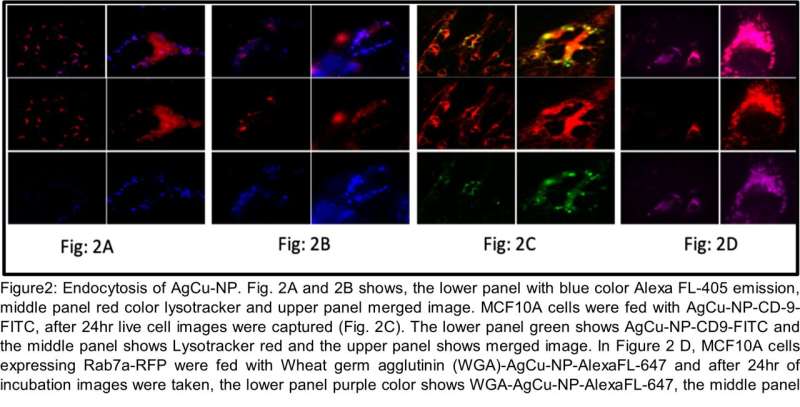
Metallic nanoparticles made from silver and copper can kill cancer cells with minimal or little side effects, say researchers from the Middle East. A study published in Advanced Biology showed that the metallic particles “were significantly toxic to cancer cells, while having no significant toxicity on healthy cells,” according to Prof. Yousef Haik of the University of Sharjah.
Cancer treatment relies heavily on chemotherapy drugs, but their low tumor specificity, body resistance to the drug and other side effects, occasionally leading to death, have prompted scientists to seek alternative treatments.
On such alternative novel treatment that has emerged recently relies on inorganic nanoparticles. The treatment has potential as a new anticancer drug that could overcome conventional body resistance that accompanies drugs targeting body tissues.
The global burden of cancer is great, with 18.1 million new cancers cases and 9.6 million associated deaths reported in 2018.
Medical research partly attributes the high mortality rate, particularly in older adults to the toxicity risks involved when administering chemotherapy in treatment. A British inquiry has found that administering chemotherapy to cure seriously ill cancer patients caused or hastened death in 27% of cases.
Radiation, also known as radiotherapy, can kill or slow the growth of cancer cells, but it can also damage healthy ones. A research study, carried out by the Journal of the American Heart Association, shows that 292,102 (13.19%) out of 2, 214,994 cancer patients died due to the side effects of radiotherapy.
Spurred by their reduced toxicity, lack of stability, retention effect and precise targeting, scientist are investigating the use of metallic nanoparticles for the treatment of cancer.
However, research by Prof. Haik and colleagues stands out for its novel technique of getting nanoparticles into exosomes while forming inside a cell.
To ensure metallic nanoparticles directly target cancerous cells, the particles are fed into healthy cells of the same tissue origin as the cancer, said Prof. Haik.
He added that the particles then get internalized into exosomes “through a biogenesis process and shed outside the cells as drug loaded vesicles.”
Exosomes are tiny sac-like structures that are formed inside the cells and play a primary role in communication between cells and organs.
“Exosomes derived from healthy cells tend to preferentially accumulate in tumor cells of the same tissue origin by 10 folds more than any other cells due to composition matching between these exosomes and these cells,” Prof. Haik stressed.
Prof. Haik co-authored the study with colleagues from Qatar’s Hamad Bin Khalifa University. The uniqueness of their research is based on using healthy cell exosomes fed with metallic nanoparticles as a means to target and kill cancerous cells.
“If the finding is applied as treatment, the novel drug will damage cancerous cells, leaving no harmful effects on the surrounding healthy tissues,
“Drug carriers decorated with antibodies are used to improve tumor targeting, however, their immunogenicity, large size, cost and lack of well-defined surface receptors limits their application,” Prof. Haik said.
The study provided a fresh and significant platform for a “complimentary anticancer drug and a smart delivery vesicle,” which Prof. Haik, described as “a foundational resource for the emerging field of nanoengineering and medicine.”
“Silver and copper nanoparticles have shown to preferentially kill cancer cells at a low concentration without any effect on healthy cells within the therapeutic dose.”
The researchers’ finding that metallic nanoparticles can kill cancerous cells with minimum side effects is a promising approach to pharmacology with expectations that might revolutionize the field if a metallic nanoparticle-based drug is manufactured.
“Our treatment is based on administering silver-copper nanoparticles that kill cancer cells, but leave surrounding healthy cells intact,” said Prof. Haik.
Prof. Haik said he and his colleagues needed further investigations before their findings reached the clinical stage. “However, our study demonstrated the feasibility of producing novel drug carriers from healthy cells,” he noted.
More information:
Sarmadia Ashraf et al, Biogenesis of Exosomes Laden with Metallic Silver–Copper Nanoparticles Liaised by Wheat Germ Agglutinin for Targeted Delivery of Therapeutics to Breast Cancer, Advanced Biology (2022). DOI: 10.1002/adbi.202200005
Provided by
University of Sharjah
Citation:
Metallic nanoparticles can kill cancer cells leaving healthy ones intact, say researchers (2023, June 27)
retrieved 27 June 2023
from https://phys.org/news/2023-06-metallic-nanoparticles-cancer-cells-healthy.html
This document is subject to copyright. Apart from any fair dealing for the purpose of private study or research, no
part may be reproduced without the written permission. The content is provided for information purposes only.










